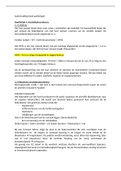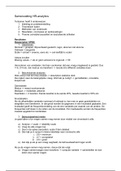Psychodynamic approach 16 marker
The psychodynamic approach was founded by Sigmund Freud who suggested that
unconscious drives operate on the conscious human mind (which is merely just the ‘tip of
the iceberg’) by directing our behaviour and are mediated my defence mechanisms such as
repression and denial to prevent anxiety evoking memories form resurfacing. According to
Freud our personality has three structures the id, the ego and the superego. The id operates
in the unconscious and acts according to selfish aggressive instincts on the pleasure
principle, the superego acts on the morality principle and the ego mediates between the
demands of the superego and the id working on the reality principle.
Freud also believed that personality developed through stages called the psychosexual
stages oral, anal, phallic and genital. In each stage tension would build up due to sexual
desires that must be resolved in order to progress to the next stage. However, if they aren’t
resolved then a fixation will occur where the child becomes stuck in this stage and carries on
certain behaviours associated with this stage through their adult life.
A criticism of the psychodynamic approach is the use of idiographic approach by using case
studies such as little Hans who had a phobia of horses as they symbolised his father. This
special psychological interest on numerous case studies through qualitive subjective
conclusions means that, this research cannot be generalised beyond the individual being
studied. Which therefore means that, psychodynamic research cannot be used to formulate
general laws and can’t take a nomothetic approach as it is extremely subjective and specific
to that individual.
Another criticism of the psychodynamic approach is that, its untestable as the unconscious
isn’t measurable as we aren’t actually aware of it. As Karl Popper said because the approach
is unfalsifiable, so it is considered as a pseudoscience with low internal validity as no
concrete testable predictions were made. The psychodynamic approach in turn does
nothing to improve the credibility of psychology as a science therefore reducing funding and
opportunities.
However, one positive of the psychodynamic approach is that the development of
psychoanalysis led to a huge shift in thinking as new studies and actual analysis were
beginning to be used not just introspection. This has led to the development of the
psychoanalytic therapy which a large-scale study by Maaat 2009 shows that it is actually
tremendously successful in improving symptoms. Therefore the psychodynamic
contribution to treatments of various psychological disorders such as depression increases
the credibility of the approach.
The psychodynamic approach was founded by Sigmund Freud who suggested that
unconscious drives operate on the conscious human mind (which is merely just the ‘tip of
the iceberg’) by directing our behaviour and are mediated my defence mechanisms such as
repression and denial to prevent anxiety evoking memories form resurfacing. According to
Freud our personality has three structures the id, the ego and the superego. The id operates
in the unconscious and acts according to selfish aggressive instincts on the pleasure
principle, the superego acts on the morality principle and the ego mediates between the
demands of the superego and the id working on the reality principle.
Freud also believed that personality developed through stages called the psychosexual
stages oral, anal, phallic and genital. In each stage tension would build up due to sexual
desires that must be resolved in order to progress to the next stage. However, if they aren’t
resolved then a fixation will occur where the child becomes stuck in this stage and carries on
certain behaviours associated with this stage through their adult life.
A criticism of the psychodynamic approach is the use of idiographic approach by using case
studies such as little Hans who had a phobia of horses as they symbolised his father. This
special psychological interest on numerous case studies through qualitive subjective
conclusions means that, this research cannot be generalised beyond the individual being
studied. Which therefore means that, psychodynamic research cannot be used to formulate
general laws and can’t take a nomothetic approach as it is extremely subjective and specific
to that individual.
Another criticism of the psychodynamic approach is that, its untestable as the unconscious
isn’t measurable as we aren’t actually aware of it. As Karl Popper said because the approach
is unfalsifiable, so it is considered as a pseudoscience with low internal validity as no
concrete testable predictions were made. The psychodynamic approach in turn does
nothing to improve the credibility of psychology as a science therefore reducing funding and
opportunities.
However, one positive of the psychodynamic approach is that the development of
psychoanalysis led to a huge shift in thinking as new studies and actual analysis were
beginning to be used not just introspection. This has led to the development of the
psychoanalytic therapy which a large-scale study by Maaat 2009 shows that it is actually
tremendously successful in improving symptoms. Therefore the psychodynamic
contribution to treatments of various psychological disorders such as depression increases
the credibility of the approach.











